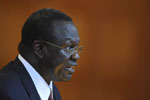
South Sudan Vice President Riek Machar has returned to Juba after 12 days of negotiations in Khartoum with the North’s Vice President Ali Osman Mohamed Taha, and he reports that they’re making progress. The two men, plus U.S. Special Envoy Scott Gration who was in Khartoum briefly, discussed major issues stalling the implementation of the Comprehensive Peace Agreement, the deal that ended the North-South civil war in 2005.
According to Machar, who was quoted in the Sudan Tribune, the two sides have come closer to agreeing on the required turnout for the referendum, a vote that will determine whether the South secedes or remains united with the North. Machar reported that the ruling National Congress Party, or NCP, had backed away from its original demand—a 66 percent turnout—but did not say what the new percentage would be to legitimize the vote. He will be presenting this proposal to the SPLM’s Political Bureau.
Just three weeks ago, Machar announced that he’d struck a deal consisting of a simple majority and two-thirds turnout with the NCP. These thresholds were rejected by the Politburo.
Machar said that negotiations will probably resume in Khartoum in the next three days and warned that time is running out—no exaggeration given that the Sudanese legislature has a mere 17 days left to vote on Machar’s and Taha’s proposed referendum law before breaking for recess until next April.
Meanwhile, on the election front, rumors of postponing legislative elections have leaked out through the Sudan Tribune. The story, which is only being reported by the Sudan Tribune, says the council of political parties, a body established by the Government of National Unity, will propose to separate executive and legislative elections, and to postpone the latter. According to the article, the council said this proposal was based on the complexities of the legislative elections and the fact that they are linked to controversial issues that have not been resolved, including border demarcation and the census—not to mention the referendum. The article also quotes opposition leader Hassan al-Turabi, who claimed that the U.S. and UK were behind the plan.
Photo: South Sudan Vice President Riek Machar (AP)

